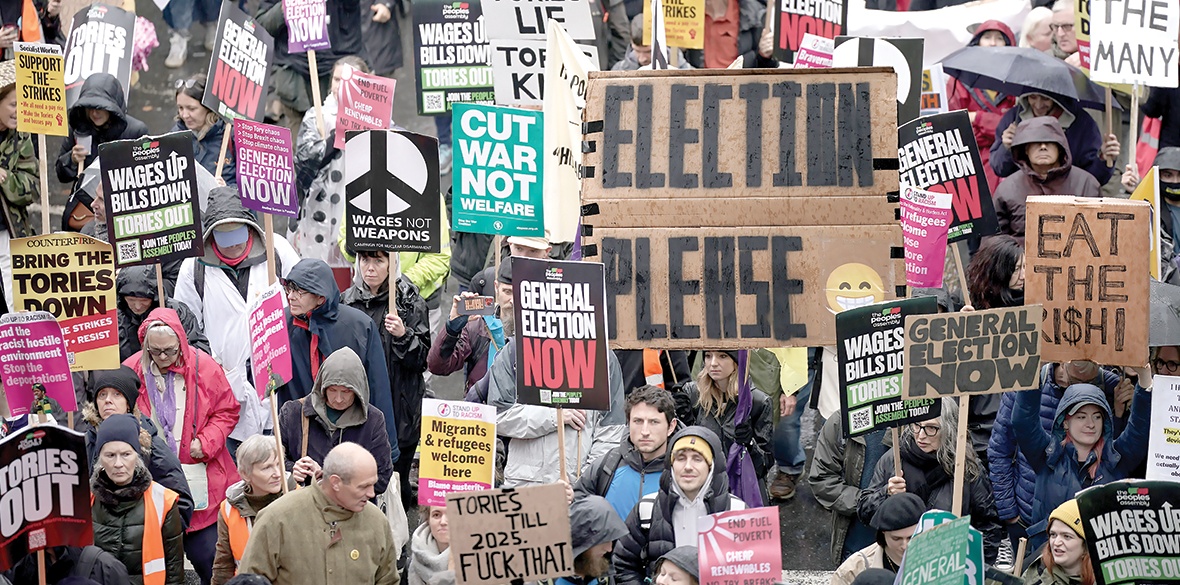This is the last article you can read this month
You can read more article this month
You can read more articles this month
Sorry your limit is up for this month
Reset on:
Please help support the Morning Star by subscribing here
THE fact that, in a year in which will mark the 13th anniversary of the Conservative Party returning to office, we are discussing another crisis — and another round of austerity being introduced in the name of responding to it — is truly illustrative of both this government’s skewed priorities and its bankruptcy of ideas.
From the Cameron Cabinet with the Lib Dems (which made austerity its flagship policy) throughout the tenures of Theresa May and Boris Johnson (who continued it while talking about Brexit a lot), as well as the short-lived Truss era (when a particularly haphazard version of it was attempted) and Rishi Sunak today, making the majority pay in order to protect the wealth of the class which the Tories represent has been a thread of continuity.
The context of millions having already experienced attacks on their living standards over more than a decade (along with the scandalous rises in bills and prices more recently) is set to make the impact of this latest package of austerity measures all the more devastating.
While Chancellor Jeremy Hunt’s Autumn Statement was packaged as a reversal of the disastrous path outlined in his doomed predecessor Kwasi Kwarteng’s now infamous “mini-budget,” the Institute for Public Policy Research found that real household disposable income is set to decline by 7 per cent over the next two years.
However, we are seeing more and more sections of the labour movement make it clear that they are not willing to be squeezed even further for the sake of ever-increasing profits.
As well as ongoing industrial action from unions with a strong history of workplace organising such as the RMT and CWU (and numerous education unions either in dispute or currently balloting members), sectors of the workforce by no means regarded as bastions of militancy have joined the fightback — with members of the Royal College of Nursing going on nationwide strike for the first time in their union’s history.
For all the demonisation of prominent trade unionists and the members they are elected to represent from the right-wing gutter press, huge sections of the public are clearly on board with the core message being put forward in these disputes: “We are not prepared to take any more.”
Polling conducted by Savanta last month found plurality to majority support for further action from nurses, postal workers, teachers and rail staff.
It is precisely because growing numbers of people are both taking action themselves and/or identifying with other workers in struggle that the Tories are proposing anti-union legislation which is draconian even by their own standards.
The trend in public attitudes also demonstrates why the argument pushed by some currents inside Labour (and their allies in the press) that the party would somehow alienate voters and fall into a “Tory trap” by taking a clear stance in support of strikers simply doesn’t hold up under scrutiny.
A telling moment in shadow health secretary Wes Streeting’s interview on HardTalk of BBC News 24 (hardly a channel with a commitment to economic change comparable to this publication!) occurred when host Stephen Sackur pointed out that even a US president with the Establishment track record of Joe Biden has placed an emphasis on flagship policies such as action on student loan debt (which at least helped limit Republican gains to underwhelming numbers in last year’s midterm elections), and asked what Labour’s equivalent would be.
While Streeting responding by raising Keir Starmer’s proposal for “Great British Energy” was at least a change from obsessively denouncing Labour’s previous leader from over three years ago as evil incarnate and performing some kind of bizarre ritual designed to purge his spirit, it reflected a lack of bold ideas to address the scale of the crisis affecting those the party needs to champion the interests of.
There is no shortage of public appetite for a new approach to the economy — with Opinium finding that just 16 per cent of those who voted Conservative at the last general election consider austerity to have been a success, compared with 57 per cent who viewed it as a failure.
The lack of a strong case from the leadership of the Labour Party (and its equivalents across much of Europe) for a shift away from neoliberalism in the aftermath of the 2007-8 financial crash did huge damage and needlessly turned a crisis caused by rampant free markets into yet another opportunity for the right. It’s vital that this is not allowed to happen again.
Now is the time to put forward a programme of public ownership to end rip-off prices in sectors such as energy and rail, giving our public services the investment they need to retain dedicated staff and address issues such as social care, and implementing measures including wealth taxes to end the era of an economy run by and for the rich.
Although putting these policies forward in Westminster has largely been left to the Socialist Campaign Group, the rise of numerous local authorities/administrations using their (admittedly limited) powers to pursue a popular progressive alternative is a welcome development.
As the impact of yet further measures hits communities even harder, let’s make 2023 a year where all those fighting for positive change are strengthened.
Follow Ken Livingstone at www.twitter.com/ken4london and www.facebook.com/kenlivingstoneofficial.











